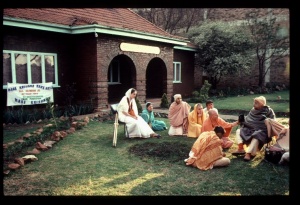SB 1.17.30: Difference between revisions
m (1 revision(s)) |
No edit summary |
||
| Line 1: | Line 1: | ||
{{info | {{info | ||
|speaker= | |speaker=Sūta Gosvāmī | ||
|listener=Sages of | |listener=Sages of Naimiṣāraṇya | ||
}} | }} | ||
[[Category:Srimad-Bhagavatam - Canto 01 Chapter 17]] | |||
[[Category:Bhagavatam Verses Spoken by Suta Gosvami - Vanisource|011730]] | |||
<div style="float:left">'''[[Srimad-Bhagavatam]] - [[SB 1|First Canto]] - [[SB 1.17: Punishment and Reward of Kali|Chapter 17: Punishment and Reward of Kali]]'''</div> | |||
<div style="float:right">[[File:Go-previous.png|link=SB 1.17.29]] '''[[SB 1.17.29]] - [[SB 1.17.31]]''' [[File:Go-next.png|link=SB 1.17.31]]</div> | |||
{{CompareVersions|SB|1.17.30|SB 1965|SB 1972-77}} | |||
{{RandomImage}} | |||
==== TEXT 30 ==== | ==== TEXT 30 ==== | ||
<div class="verse"> | |||
<div | :patitaṁ pādayor vīraḥ | ||
patitaṁ pādayor vīraḥ | :kṛpayā dīna-vatsalaḥ | ||
kṛpayā dīna-vatsalaḥ | :śaraṇyo nāvadhīc chlokya | ||
śaraṇyo nāvadhīc chlokya | :āha cedaṁ hasann iva | ||
āha cedaṁ hasann iva | |||
</div> | </div> | ||
| Line 18: | Line 23: | ||
==== SYNONYMS ==== | ==== SYNONYMS ==== | ||
<div class="synonyms"> | |||
<div | ''patitam''—fallen; ''pādayoḥ''—at the feet; ''vīraḥ''—the hero; ''kṛpayā''—out of compassion; ''dīna-vatsalaḥ''—kind to the poor; ''śaraṇyaḥ''—one who is qualified to accept surrender; ''na''—not; ''avadhīt''—did kill; ''ślokyaḥ''—one who is worthy of being sung; ''āha''—said; ''ca''—also; ''idam''—this; ''hasan''—smiling; ''iva''—like. | ||
</div> | </div> | ||
| Line 26: | Line 30: | ||
==== TRANSLATION ==== | ==== TRANSLATION ==== | ||
<div class="translation"> | |||
<div | |||
Mahārāja Parīkṣit, who was qualified to accept surrender and worthy of being sung in history, did not kill the poor surrendered and fallen Kali, but smiled compassionately, for he was kind to the poor. | Mahārāja Parīkṣit, who was qualified to accept surrender and worthy of being sung in history, did not kill the poor surrendered and fallen Kali, but smiled compassionately, for he was kind to the poor. | ||
</div> | </div> | ||
| Line 34: | Line 37: | ||
==== PURPORT ==== | ==== PURPORT ==== | ||
<div class="purport"> | |||
Even an ordinary ''kṣatriya'' does not kill a surrendered person, and what to speak of Mahārāja Parīkṣit, who was by nature compassionate and kind to the poor. He was smiling because the artificially dressed Kali had disclosed his identity as a lower-class man, and he was thinking how ironic it was that although no one was saved from his sharp sword when he desired to kill, the poor lower-class Kali was spared by his timely surrender. Mahārāja Parīkṣit's glory and kindness are therefore sung in history. He was a kind and compassionate emperor, fully worthy of accepting surrender even from his enemy. Thus the personality of Kali was saved by the will of Providence. | |||
</div> | |||
<div | |||
<div style="float:right; clear:both;">[[File:Go-previous.png|link=SB 1.17.29]] '''[[SB 1.17.29]] - [[SB 1.17.31]]''' [[File:Go-next.png|link=SB 1.17.31]]</div> | |||
</div> | __NOTOC__ | ||
__NOTOC__ | __NOEDITSECTION__ | ||
Revision as of 12:26, 2 May 2021

A.C. Bhaktivedanta Swami Prabhupada
TEXT 30
- patitaṁ pādayor vīraḥ
- kṛpayā dīna-vatsalaḥ
- śaraṇyo nāvadhīc chlokya
- āha cedaṁ hasann iva
SYNONYMS
patitam—fallen; pādayoḥ—at the feet; vīraḥ—the hero; kṛpayā—out of compassion; dīna-vatsalaḥ—kind to the poor; śaraṇyaḥ—one who is qualified to accept surrender; na—not; avadhīt—did kill; ślokyaḥ—one who is worthy of being sung; āha—said; ca—also; idam—this; hasan—smiling; iva—like.
TRANSLATION
Mahārāja Parīkṣit, who was qualified to accept surrender and worthy of being sung in history, did not kill the poor surrendered and fallen Kali, but smiled compassionately, for he was kind to the poor.
PURPORT
Even an ordinary kṣatriya does not kill a surrendered person, and what to speak of Mahārāja Parīkṣit, who was by nature compassionate and kind to the poor. He was smiling because the artificially dressed Kali had disclosed his identity as a lower-class man, and he was thinking how ironic it was that although no one was saved from his sharp sword when he desired to kill, the poor lower-class Kali was spared by his timely surrender. Mahārāja Parīkṣit's glory and kindness are therefore sung in history. He was a kind and compassionate emperor, fully worthy of accepting surrender even from his enemy. Thus the personality of Kali was saved by the will of Providence.